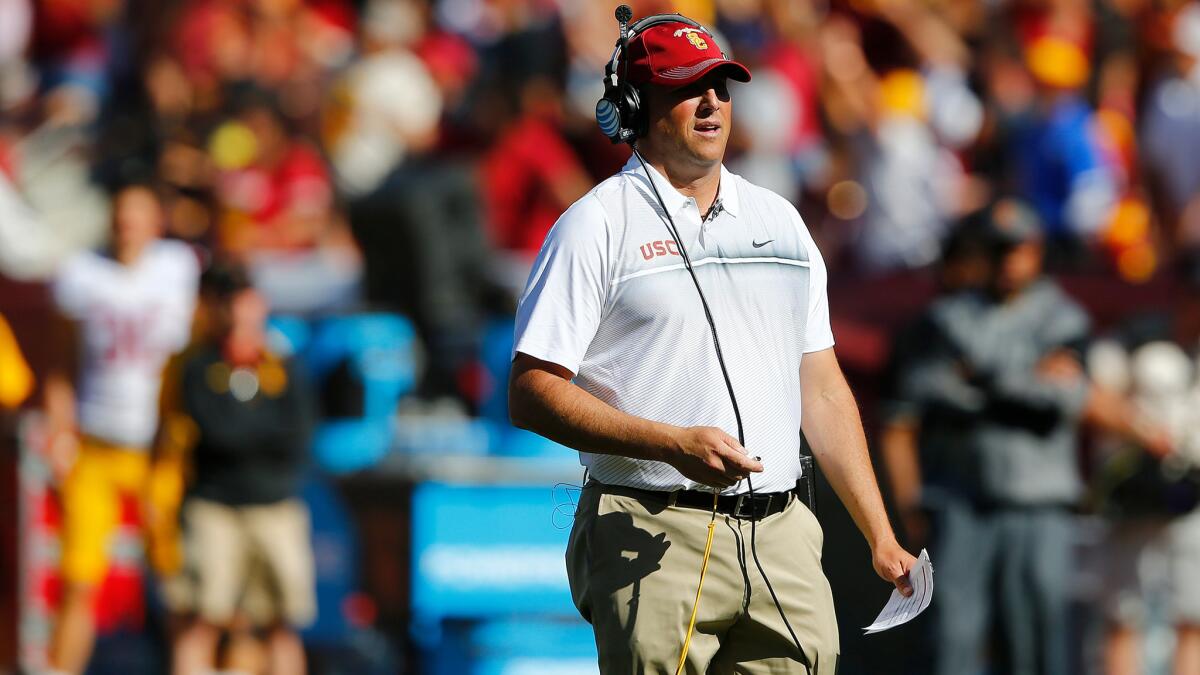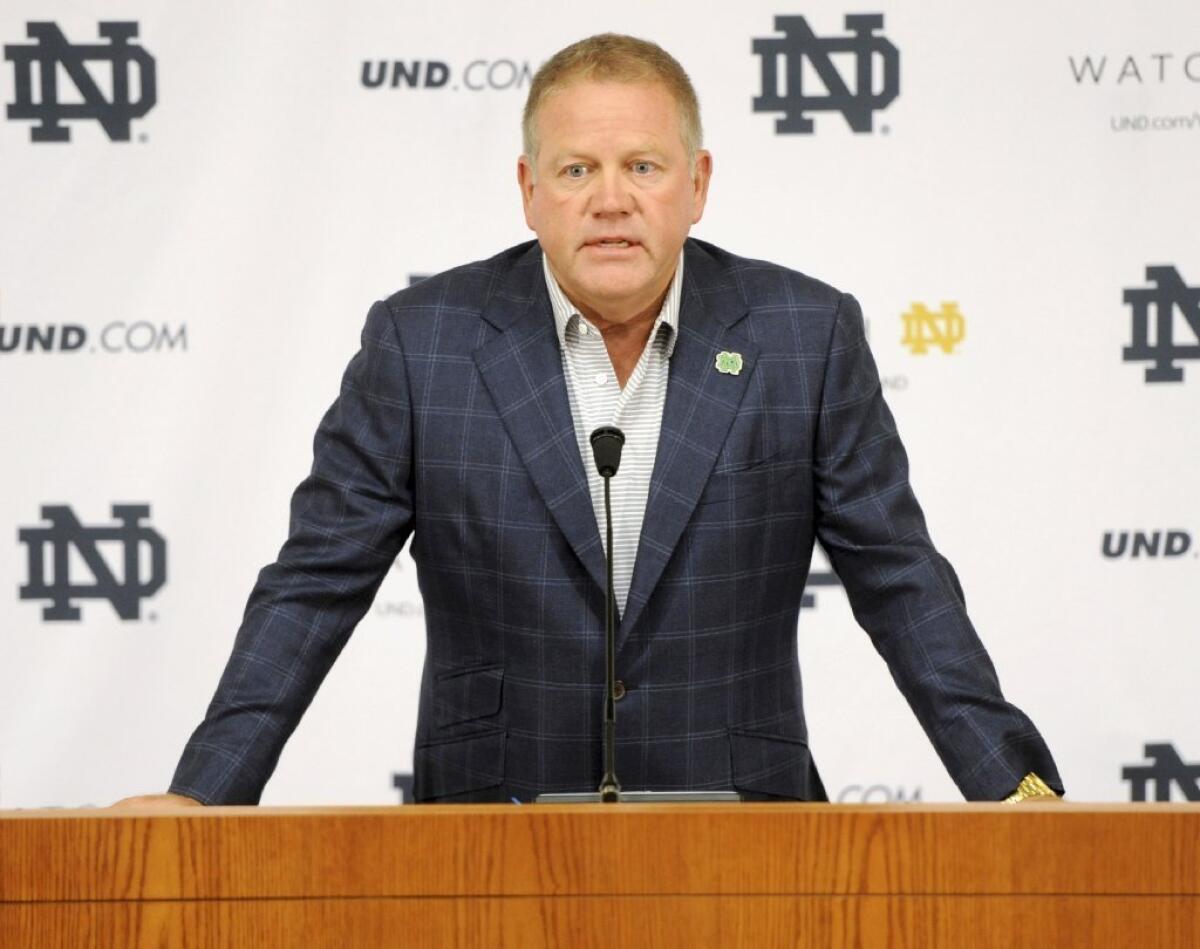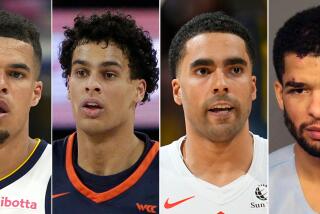Column: When college players are suspected of lawbreaking, the ethics can be tricky for schools

- Share via
The news out of Washington State sounded more than vaguely familiar.
A linebacker on the football team had been arrested on suspicion of robbery and assault. There was no official word on his playing status for this weekend.
“Anything we do with that will be handled internally,” Coach Mike Leach told reporters during a Tuesday morning teleconference. “I mean, everybody’s innocent until proven guilty.”
That might be true in a court of law, but whenever a college football player is so much as suspected of breaking the law, universities face a decision.
Accusations can trigger strong emotions and the public often wants immediate action. It wants the athlete to be kicked off the team or at least suspended.
At the same time, boosters might pressure the school to keep stars in the lineup. And there is the whole presumption-of-innocence thing.
Washington State isn’t alone in dealing with this issue. USC, Notre Dame and a half-dozen other big-time programs have had players investigated or arrested — but not necessarily convicted — over the past few months.
“It’s hard for these institutions,” said Shawn E. Klein, a sports ethicist at Arizona State. “I don’t envy the people who have to strike that balance.”
This isn’t like a criminal trial in which a prosecutor must prove guilt beyond a reasonable doubt. Universities and coaches have substantial leeway to impose team rules.
I’ve been through this before. I go to work every day with our roster and if I’m informed of anything, I’ll react accordingly.
— Brian Kelly, Notre Dame coach regarding players suspected of breaking the law

“You don’t have a constitutional right to play football,” said Maureen Weston, a Pepperdine law professor. “It’s discretionary.”
The morals and ethics can be tricky, if only because no two cases are exactly alike.
Just this week, reports have emerged of police focusing on players at North Carolina and Minnesota in separate sexual assault cases. With the Minnesota players, it wasn’t clear if they were considered suspects or witnesses.
At USC, linebacker Osa Masina and defensive end Don Hill have been at the center of a weeks-long sexual assault investigation.
Notre Dame has dealt with a string of incidents this summer, including a routine traffic stop that turned up five players allegedly in possession of a “significant” amount of marijuana and a loaded handgun.
“I’ve been through this before,” Coach Brian Kelly told reporters last week, explaining that he defers to the university’s student conduct office in such matters.
“So I don’t wring my hands. I don’t wait around for the phone calls,” Kelly said. “I go to work every day with our roster and if I’m informed of anything, I’ll react accordingly.”
If that sounds like ducking the question, USC Coach Clay Helton has made similar comments regarding Masina and Hill, saying he has “full confidence in the guidance of the university.”
The players, who did not play in the Trojans’ first two games, were suspended from all team activities, it was announced Tuesday. No explanation was given for the change in status; neither Masina nor Hill had been charged with a crime.
It seems that each school has its own way of dealing with athletes in trouble.
While Minnesota quietly held its players out of the game, Notre Dame took a variety of actions in its cases.
One of the players in the car was kicked off the team over that handgun allegation. The other four were disciplined internally, Kelly said, but have been allowed to practice and appear in games.
In a separate incident, a senior cornerback pleaded not guilty to resisting arrest and battery of a police officer but was indefinitely suspended.
Different types of penalties aren’t necessarily a bad thing.
“There isn’t one answer that will fit each and every case,” Klein said. “We want to have some discretion to make sure that everybody’s rights and interests are considered.”
No one policy is necessarily better than another — some schools might call for immediate suspension while others take a wait-and-see approach. That’s fine with ethicists, so long as administrators have established guidelines.
Problems arise when there is no existing standard or the rules are not applied equally to all students. Stephen Mosher, who teaches sports ethics at Ithaca College in New York, sees inconsistencies across college sports.
“It’s beyond muddy,” he said. “Sometimes it depends on where the player is on the depth chart or who you’re playing next week.”
Another potential catch: “You probably don’t want coaches making these decisions,” Klein said. “They’re not in position to be impartial or objective.”
So maybe it wasn’t so awful when Helton or Kelly deferred to university administration. Still, with the police blotter a routine part of big-time football, the public has reason to be skeptical.
“These decisions should be guided by some kind of deliberate decision-making approach, something that suggests there has been a serious discussion,” said Ann Skeet, director of leadership ethics at Santa Clara University. “That’s a good place for people to start.”
david.wharton@latimes.com
Twitter: LATimesWharton
More to Read
Go beyond the scoreboard
Get the latest on L.A.'s teams in the daily Sports Report newsletter.
You may occasionally receive promotional content from the Los Angeles Times.











